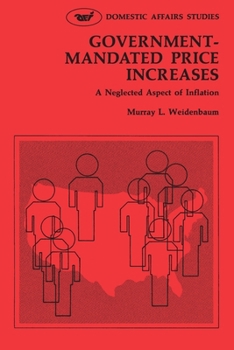Government Mandated Price Increases: A Neglected Aspect of Inflation
Government-Mandated Price Increases: A Neglected Aspect of Inflation by Murray L. Weidenbaum takes a look at government policies which, however inadvertently, impose higher costs on private business and, thereby, raise consumer prices. In recent years, partly in an attempt to reach national objectives without spending large amounts of public funds, government has increasingly resorted to a practice that, in effect, transfers public requirements to the private sector. Thus, for example, instead of the public treasury's bearing the full burden of cleaning up the environment or improving highway safety, private decision makers are influenced or required to foot the bill. Weidenbaum notes that the imposition of "socially desirable" requirements on business looks like an inexpensive way to fulfill national objectives: it costs the government almost nothing and therefore seems to add little to the taxpayers' burden. But, he asks, does the nation really get a "free lunch"? He concludes that that while the goals of government regulation may be worthy, the costs show up in higher prices - a "hidden tax" that has simply been shifted from taxpayer to consumer. Murray L. Wiedenbaum (1927-2014) was director of the Center for the Study of American Business at Washington University in St. Louis, Missouri, and an adjunct scholar at the American Enterprise Institute. From 1969 to 1971 he served as assistant secretary of the Treasury for economic policy.
Format:Paperback
Language:English
ISBN:084473151X
ISBN13:9780844731513
Release Date:January 1975
Publisher:AEI Press
Length:112 Pages
Weight:0.45 lbs.
Dimensions:0.5" x 5.9" x 8.9"
Customer Reviews
0 rating





